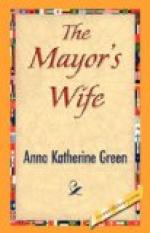Answering with a smile, I waited patiently while he talked terms and other equally necessary details, then dropping all these considerations, somewhat in his own grand manner, I made this remark:
“If your wife likes me, which very possibly she may fail to do, I shall have a few questions to ask you before I settle down to my duties. Will you see that an opportunity is given me for doing this?”
His assent was as frank as all the rest, and the next moment he left the room.
As he passed out I heard him remark to Miss Davies:
“I expect Miss Saunders at my house before nightfall. I shall reserve some minutes between half-past five and six in which to introduce her to Mrs. Packard.”
CHAPTER II
QUESTIONS
I knew all the current gossip about Mrs. Packard before I had parted with Miss Davies. Her story was a simple one. Bred in the West, she had come, immediately after her mother’s death, to live with that mother’s brother in Detroit. In doing this she had walked into a fortune. Her uncle was a rich man and when he died, which was about a year after her marriage with Mr. Packard and removal to C—, she found herself the recipient of an enormous legacy. She was therefore a woman of independent means, an advantage which, added to personal attractions of a high order, and manners at once dignified and winning, caused her to be universally regarded as a woman greatly to be envied by all who appreciated a well-founded popularity.
So much for public opinion. It differs materially from that just given me by her husband.
The mayor lived on Franklin Street in a quarter I had seldom visited. As I entered this once aristocratic thoroughfare from Carlton Avenue, I was struck as I had been before by its heterogeneous appearance. Houses of strictly modern type neighbored those of a former period, and it was not uncommon to see mansion and hovel confronting each other from the opposite side of the street. Should I find the number I sought attached to one of the crude, unmeaning dwellings I was constantly passing, or to one of mellower aspect and possibly historic association?
I own that I felt a decided curiosity on this point, and congratulated myself greatly when I had left behind me a peculiarly obnoxious monstrosity in stone, whose imposing proportions might reasonably commend themselves to the necessities, if not to the taste of the city’s mayor.
A little shop, one story in height and old enough for its simple wooden walls to cry aloud for paint, stood out from the middle of a row of cheap brick houses. Directly opposite it were two conspicuous dwellings, neither of them new and one of them ancient as the street itself. They stood fairly close together, with an alley running between. From the number I had now reached it was evident that the mayor lived in one of these. Happily it was




